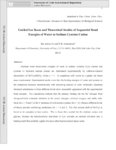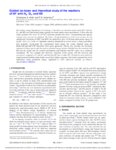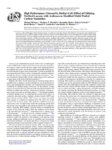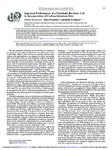|
|
Creator | Title | Description | Subject | Date |
| 101 |
 | Miller, Joel Steven | Formation of Ni[C4(CN)8] from the reaction of Ni(COD)2 (COD = 1,5-cyclooctadiene) with TCNE in THF | The dissolution of Ni(COD)2 (COD = 1,5-cyclooctadiene) into dichloromethane leads to decomposition and formation of a room temperature magnetic material, whereas the reaction of Ni(COD)2 and tetracyanoethylene (TCNE) in THF forms paramagnetic materials including NiII[C4(CN)8](THF)2.xTHF. These resu... | Dinuclear complexes | 2007 |
| 102 |
 | Miller, Joel Steven; Epstein, Arthur J. | Forthcoming attractions | Magnets made from molecules and ions having spins in p orbitals have only been discovered in the past decade. Their solubility in organic solvents and room temperature manufacture means that they should find a variety of applications. | Electron; Temperature; Magnets | 1994 |
| 103 |
 | Armentrout, Peter B. | Fragmentation reactions of thiourea- and urea-compounds examined by tandem MS-, energy-resolved CID experiments, and theory | Fragmentation reactions of thiourea- and urea-compounds, which are promising reagents for chemical crosslinking (XL), are investigated in detail by collision-induced dissociation (CID) experiments in a quadrupole ion trap (QIT), energy-resolved CID experiments, and computational modeling. For this s... | | 2012-01-01 |
| 104 |
 | Voth, Gregory Alan | Further developments in the local-orbital density-functional-theory tight-binding method | Quantum-mechanical methods have become increasingly reliable as a complementary tool to experimental research. A variety of methods exist ranging in complexity from semiempirical methods to density-functional-theory (DFT) methods [using either the local-density approximation (LDA) or the generalize... | Sankey-Niklewaki method; Fireball method; Pseudopotential; Exchange-correlation interactions; Gallium nitride; H20 dimer; Copper; gas-phase HMX | 2001-10 |
| 105 |
 | Morse, Michael David | The ground state and excited ?-hole states of CuAu | Resonant two-photon ionization spectroscopy has been applied to jet-cooled diatomic CuAu. Eight band systems have been observed, rotationally resolved, and analyzed. The ground state is X??+ in symmetry, deriving from the 3d??Cu 5d??Au, ?? molecular configuration. Its bond length has been determined... | | 1991 |
| 106 |
 | Armentrout, Peter B. | Guided ion beam and theoretical studies of sequential bond energies of water to sodium cysteine cation | Absolute bond dissociation energies of water to sodium cysteine (Cys) cations and cysteine to hydrated sodium cations are determined experimentally by collision-induced dissociation of Na+Cys(H2O)x, where x = 1 - 4, complexes with xenon in a guided ion beam mass spectrometer. Experimental results sh... | | 2010-01-01 |
| 107 |
 | Armentrout, Peter B. | Guided ion beam and theoretical studies of the reaction of Ag+ with CS2: gas-phase thermochemistry of AgS+ and AgCS+ and insight into spin-forbidden reactions | The gas-phase reactivity of the atomic transition metal cation, Ag+, with CS2 is investigated using guided-ion beam mass spectrometry. Endothermic reactions forming AgS+ and AgCS+ are observed but are quite inefficient. This observation is largely attributed to the stability of the closed shell Ag+(... | | 2010 |
| 108 |
 | Armentrout, Peter B. | Guided ion beam and theoretical studies of the reaction of Ru+ with CS2 in the gas-phase: thermochemistry of RuC+, RuS+, and RuCS+ | Abstract: The gas-phase reactivity of the atomic transition metal cation, Ru+, with CS2 is investigated using guided-ion beam mass spectrometry (GIBMS). Endothermic reactions forming RuC+, RuS+, and RuCS+ are observed. Analysis of the kinetic energy dependence of the cross sections for formation of ... | | 2010 |
| 109 |
 | Armentrout, Peter B. | Guided ion beam and theoretical study of the reactions of Au+ with H2, D2, and HD | Reactions of the late third-row transition metal cation Au+ with H2, D2, and HD are examined using guided ion beam tandem mass spectrometry. A flow tube ion source produces Au+ in its 1S (5d10) electronic ground state level. Corresponding state-specific reaction cross sections for forming AuH+ an... | | 2011 |
| 110 |
 | Armentrout, Peter B. | Guided ion beam and theoretical study of the reactions of Hf+ with H2, D2, and HD | The kinetic energy dependences of reactions of the third-row transition metal cation Hf+ with H2, D2, and HD were determined using a guided ion beam tandem mass spectrometer. A flow tube ion source produces Hf+ in its 2D (6s25d1) electronic ground state level. Corresponding state-specific reaction c... | | 2010-01-01 |
| 111 |
 | Armentrout, Peter B. | Guided ion beam and theoretical study of the reactions of Os + with H 2, D 2, and HD | Reactions of the third-row transition metal cation Os+ with H2, D2, and HD to form OsH+ (OsD+) were studied using a guided ion beam tandem mass spectrometer. A flow tube ion source produces Os+ in its 6D (6s15d6) electronic ground state level. Corresponding state-specific reaction cross sections are... | | 2011 |
| 112 |
 | Armentrout, Peter B. | Guided ion beam studies of the reaction of Nin+ (n=2-16) with D2: nickel cluster-deuteride bond energies | The kinetic-energy dependences of the reactions of Nin+ (n=2-16) with D2 are studied in a guided ion beam tandem mass spectrometer. The products observed are NinD+ for all clusters and NinD2 + for n=5-16. Reactions for formation of NinD+ are observed to exhibit thresholds, whereas cross sections for... | Metal clusters; Nickel ions; Bond energies; Deuterides; Collision-induced dissociation; Endothermic reactions | 2002 |
| 113 |
 | Armentrout, Peter B. | Guided ion beam studies of the reactions of Crn + (n=2-18) with O2: chromium cluster oxide and dioxide bond energies | The kinetic energy dependence of the reactions of Crn+ (n=2-18) with O2 are studied in a guided ion beam mass spectrometer. A variety of CrmO2+, CrmO+, and Crm+ product ions, where m≤n, are observed, with the dioxide cluster ions dominating the products for all larger reactant cluster ions. React... | Metal clusters; Chromium ions; Oxygen; Oxygen; Bond energies; Exothermic reactions | 1998 |
| 114 |
 | Armentrout, Peter B. | Guided ion beam studies of the reactions of Crn+ (n=1-18) with CO2: chromium cluster oxide bond energies | The kinetic energy dependence of the reactions of Crn+ (n=1-18) with CO2 are studied in a guided ion beam mass spectrometer. The primary product ions are CrnO+, which then decompose by sequential loss of chromium atoms as the kinetic energy is increased. Simple collision-induced dissociation to form... | Metal clusters; Chromium ions; Oxygen; Bond energies; Exothermic reactions; Endothermic reactions | 1998 |
| 115 |
 | Armentrout, Peter B. | Guided ion beam studies of the reactions of Nin+ (n=2-18) with O2: nickel cluster oxide and dioxide bond energies | The kinetic energy dependences of the reactions of Nin + (n=2 - 18) with O2 are studied in a guided ion beam tandem mass spectrometer. A variety of NimO2+, NimO+, and Nim+ product ions, where m<n, are observed, with the dioxide cluster ions dominating the products for all larger reactant cluster io... | Metal clusters; Nickel oxide; Nickel dioxide; Bond energies; Collision-induced dissociation; Exothermic reactions | 2003 |
| 116 |
 | Armentrout, Peter B. | Guided ion beam studies of the reactions of Vn+ (n = 2-13) with D2: cluster-deuteride bond energies as a chemical probe of cluster electronic structure | The kinetic energy dependencies of the reactions of Vn+ (n=2 - 13) with D2 are studied in a guided ion beam tandem mass spectrometer. Products observed are VnD1 for all clusters and VnD2 + for n=4 - 13. All reactions are observed to exhibit thresholds, except for formation of VnD2 + for n =4,5,7,9,1... | Metal clusters; Vanadium ions; Bond energies; Endothermic reactions; Collision-induced dissociation; Transition metal ions; Deuterides | 2002 |
| 117 |
 | Armentrout, Peter B. | Guided ion beam study of collision-induced dissociation dynamics: integral and differential cross sections | The low energy collision-induced dissociation (CID) of Cr(CO)6+ with Xe is investigated using a recently modified guided ion beam tandem mass spectrometer, in the energy range from 0 to 5 eV in the center-of-mass (CM) frame. The additions to the instrument, updated with a double octopole system, and... | Collision-induced dissociation; Bond energies; Chromium carbonyl; Xenon | 2001 |
| 118 |
 | Armentrout, Peter B. | Guided ion-beam studies of the kinetic-energy-dependent reactions of Con+ (n=2-16) with D2: cobalt cluster-deuteride bond energies | The kinetic-energy-dependent cross sections for the reactions of Con + (n=2-16) with D2 are measured as a function of kinetic energy over a range of 0-8 eV in a guided ion-beam tandem mass spectrometer. The observed products are ConD+ for all clusters and ConD2+ for n=4,5,9-16. | Cobalt ions; Metal clusters; Deuteride; Collision-induced dissociation; Endothermic reactions; Bond energies | 2005 |
| 119 |
 | Armentrout, Peter B. | Guided ion-beam studies of the reactions of Con + (n=2-20) with O2: cobalt cluster-oxide and -dioxide bond energies | The kinetic-energy dependence for the reactions of Con + (n=2-20) with O2 is measured as a function of kinetic energy over a range of 0 to 10 eV in a guided ion-beam tandem mass spectrometer. A variety of Com+ , ComO+, and ComO2 + (m<n) product ions is observed, with the dioxide cluster ions domina... | Metal clusters; Cobalt ions; Collision-induced dissociation; Bond energies; Exothermic reactions; Endothermic reactions | 2005 |
| 120 |
 | Truong, Thanh | High level ab initio and density functional theory evaluation of combustion reaction energetics: NO2 and HONO elimination from dimethylnitramine | Dimethylnitramine (DMNA) is used as a model system for investigating accurate and efficient electronic structure methods for nitramines. Critical points on the potential energy surfaces of DMNA, CH3NCH3, CH3NCH2, NO2, HONO, and the transition state to HONO elimination were located through geometry o... | Dimethylnitramine; DMNA; Nitramines; Combustion reaction energetics | 1999 |
| 121 |
 | Minteer, Shelley D. | High performance glucose/O2 biofuel cell: effect of utilizing purified laccase with anthracene-modified multi-walled carbon nanotubes | Laccase, a blue multicopper oxidoreductase enzyme, is a robust enzyme that catalyzes the reduction of oxygen to water and has been shown previously to perform improved direct electron transfer in a biocathode when mixed with anthracene-modified multi-walled carbon nanotubes. Previous cathode constru... | | 2012-01-01 |
| 122 |
 | Armentrout, Peter B. | Hydrogen atom transfer reactions of He+ and Ne+ with H2, D2, and HD | The hydrogen atom transfer reactions of helium (1 +) and neon(1+) ions with isotopic molecular hydrogen (H2 , D2 , and HD) are investigated using guided ion beam techniques. These reactions are exothermic, but are known to be extremely slow at thermal energies. The cross sections for formation of... | Transfer reactions; Ion-molecule reactions; Exothermic reactions; Hydrogen; Helium ions; Neon ions; Threshold behavior; Isotope effects | 1987 |
| 123 |
 | Voth, Gregory Alan; Sarofim, Adel F. | Identification of pathways for polyaromatic growth using molecular dynamics | Reaction pathways for polyaromatic growth in combustion environments are explored theoretically using molecular dynamic techniques. The reaction systems considered include cyclization reactions that involve H atom migration. Specifically we examine the absorption of acetylene on an aromatic ring rad... | | 2004 |
| 124 |
 | Truong, Thanh | Importance of polarization in simulations of condensed phased energetic materials | An embedded cluster model is used to estimate the molecular dipole moment of crystalline dimethylnitramine (DMNA). The electrostatic potential due to the crystal is included in the calculation via the SCREEP (surface charge representation of the electrostatic embedding potential) approach. The resul... | Dimethylnitramine; DMNA; Embedded cluster model | 1999 |
| 125 |
 | Minteer, Shelley D. | Improved performance of a thylakoid bio-solar cell by incorporation of carbon quantum dots | Carbon quantum dots (CQDs) were incorporated into thylakoid bioanodes capable of direct photobioelectrocatalysis in order to increase the photocurrent generation. More thylakoids are in contact with the increased surface area which allows for greater direct electron transfer (DET). Additionally, the... | | 2014-01-01 |

























